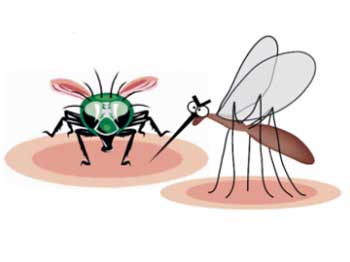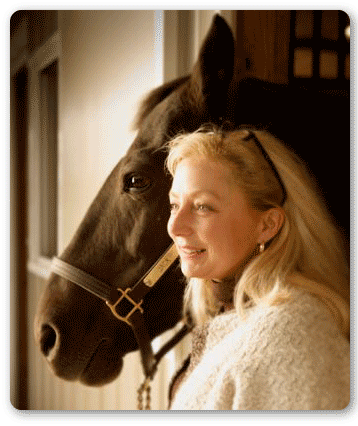Shoo Fly

There are numerous products on the market that claim to repel them, however I have found other methods that have worked well to keep flies away. One of the easiest ways to help prevent flies is to keep horse stalls clean. If possible, the stalls should be cleaned every day. This reduces the time spent cleaning, and your horse will appreciate that there is less manure in the stall to attract flies.
When disposing of manure, be sure to keep it away from the barn and any riding areas. If you have a manure pile, locate it at the back of your property. This way, flies won't be drawn to your arena or barn. Manure should be hauled out frequently, if available in your area. Spreading manure is also a common form of disposal. Be sure not to spread the manure on pastures in which horses are grazing every day. The manure should be spread in a place that is not used very often. Since spreading manure can also attract flies, be sure it is spread away from the barn.
Another way to keep flies away is to reduce standing water around the barn. This will not only help to prevent flies, but mosquitoes as well. It is especially important to keep mosquitoes away due to the West Nile Virus. Horses should be vaccinated yearly for the virus. Garbage should be disposed of regularly and the barn kept free of clutter. This will help to eliminate any areas for flies to accumulate. Tight-fitting lids should be kept on grain bins, especially if you are using sweet feed with molasses. Flies are definitely attracted to anything that is sticky and sweet. Because flies like to breed in grassy areas, tall grass should be kept mowed and trimmed down. There are numerous products available that help eliminate flies:
Automatic fly systems - This is the most expensive option, but the systems are very effective in eliminating flies. The systems, which are installed overhead, periodically mist the areas with an insecticide.
Flytraps and sticky tape - These options can usually be bought for a few dollars at any local home supply store. The flytraps and sticky tape are more economical and do help collect a significant amount of flies. When using either of these products, be sure it is safe for horses, humans and other pets.
Fly sprays - These products provide some relief to the horse, but must be applied frequently.
Fly masks - This product works great to keep flies out of horses' eyes, which can help to prevent irritation.
Flysheets - The flysheet covers the majority of the horse's body, keeping flies away. Remember that in hot climates or warm weather, the horse might sweat underneath the sheet. This may cause rubbing, which could damage the horse's skin, as well as the flysheet.
Wraps - This product is used to keep flies away from horses' legs. The wraps are worn like shipping boots, but are made out of breathable material.
Not all horses are accustomed to wearing flysheets or wraps, so be sure your horse is comfortable before continuing use of either of these products. Whatever method you choose to use, remember that nothing will completely rid your barn of flies. Try different methods to determine what works best for you. Flies are just a daily reminder that summer is here.
 Debbie has over 45 years experience with horses and equine-related businesses. She has owned, trained, boarded horses and run stables at various times in her career. She is a certified fence installer, has given balanced riding lessons, and has shown horses in Western, Western Pleasure, Trail, English, Hunter/Jumper, Fox Hunting, Hunter Trials, Dressage and driving classes. Debbie has been involved in foaling, and just about every aspect of horse ownership possible, and she welcomes your questions and comments. If you are interested in using any articles by Debbie, please send her and email.
Debbie has over 45 years experience with horses and equine-related businesses. She has owned, trained, boarded horses and run stables at various times in her career. She is a certified fence installer, has given balanced riding lessons, and has shown horses in Western, Western Pleasure, Trail, English, Hunter/Jumper, Fox Hunting, Hunter Trials, Dressage and driving classes. Debbie has been involved in foaling, and just about every aspect of horse ownership possible, and she welcomes your questions and comments. If you are interested in using any articles by Debbie, please send her and email.
